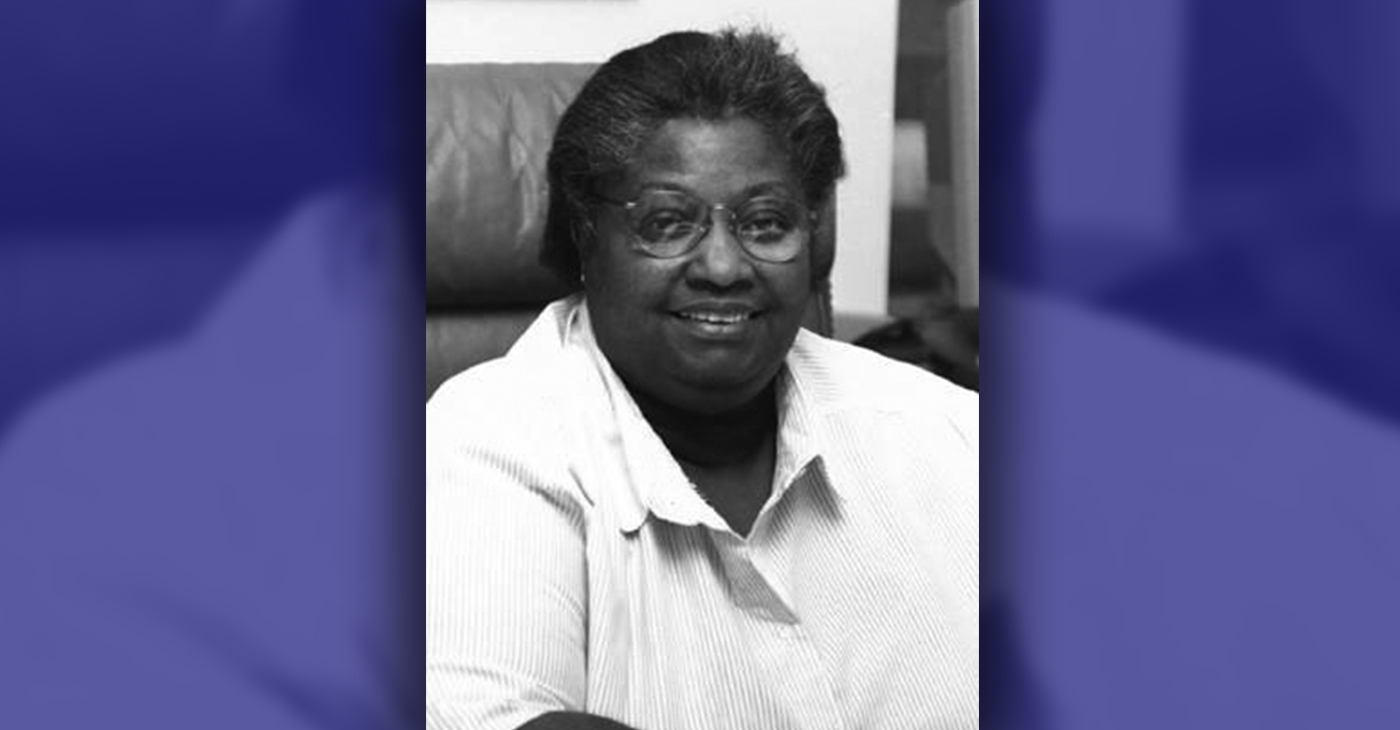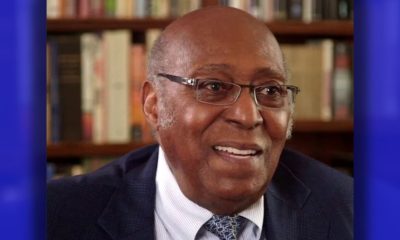Black History
Alexa Irene Canady: First Black Woman Neurosurgeon in U.S.
Some of Alexa Irene Canady’s advisors attempted to discourage her from following through on her plans. She experienced difficulties in obtaining an internship. But those roadblocks didn’t impede her dream. After graduating cum laude from medical school (1975), she joined Yale-New Haven Hospital in Bridgeport, Conn., as a surgical intern.

By Tamara Shiloh
It was during a health careers summer program at the University of Michigan that Alexa Irene Canady (b. 1950) decided to pursue medicine. Her undergraduate degree was in zoology, but she was convinced that continuing her studies at the university’s medical school was what she wanted.
It was the “summer after my junior year,” Canady was quoted as saying. “I worked in Dr. Bloom’s lab in genetics and attended a genetic counseling clinic. I fell in love with medicine.”
And she never regretted her decision.
Her initial interest was internal medicine. After being introduced to neurosurgery, she changed her path. But not everyone supported her decision.
Some of Canady’s advisors attempted to discourage her from following through on her plans. She experienced difficulties in obtaining an internship. But those roadblocks didn’t impede her dream. After graduating cum laude from medical school (1975), she joined Yale-New Haven Hospital in Bridgeport, Conn., as a surgical intern.
When her internship ended, she moved on to the University of Minnesota. There she served as a resident of the university’s department of neurosurgery, making her the first Black female neurosurgery resident in the United States. When her residency ended, she became the first Black female neurosurgeon.
“The greatest challenge I faced in becoming a neurosurgeon was believing it was possible,” Canady is famously quoted.
But the road to success was not without challenges.
Canady admits that she came close to dropping out of college because “I had a crisis of confidence.” But knowing there was a chance to win a minority scholarship in medicine, “it was an instant connection.” Despite her qualifications and high GPA, she could not escape prejudices and micro-aggressive comments.
On her first day at Yale-New Haven, Canady recalls tending to a patient when a hospital administrator passed by and commented: “Oh, you must be our new equal-opportunity package.”
The tables turned when a few years later at Children’s Hospital of Philadelphia, her fellow physicians voted her one of the top residents.
During her 22-year career as a neurosurgeon, Canady worked with young patients facing life-threatening illnesses, gunshot wounds, head trauma, hydrocephaly, and other brain injuries or diseases. Most were age 10 or younger.
Canady shares that her biggest career obstacle was convincing the neurosurgery chairman that she was “not a risk to drop out or be fired, a disaster in a program where there are only one or two residents per year. I was the first African American woman [in the department]. Along with that, my other greatest obstacle was convincing myself that someone would give me a chance to work as a neurosurgeon.”
She admits that she was worried that “because I [am] a Black woman, any practice opportunities would be limited. By being patient-centered, the practice’s growth was exponential.”
Read more about Canady’s journey to overcoming racial prejudice, patriarchy, and sexism in “Dr Alexa Irene Canady: The Incredible Story of the First Black Woman to Become a Neurosurgeon” by Isabel Carson.
Activism
Oakland Post: Week of April 24 – 30, 2024
The printed Weekly Edition of the Oakland Post: Week of April 24 – 30, 2024

To enlarge your view of this issue, use the slider, magnifying glass icon or full page icon in the lower right corner of the browser window. ![]()
Activism
Oakland Post: Week of April 17 – 23, 2024
The printed Weekly Edition of the Oakland Post: Week of April 17 – 23, 2024

To enlarge your view of this issue, use the slider, magnifying glass icon or full page icon in the lower right corner of the browser window. ![]()
Black History
Matthew Henson: Explorer Extraordinaire
Matthew Henson, a trailblazing explorer who overcame countless obstacles to leave an incredible mark on history. Born on August 8, 1866, in Charles County, Maryland, his journey is a testament to the power of determination and the spirit of adventure.

By Tamara Shiloh
Matthew Henson, a trailblazing explorer who overcame countless obstacles to leave an incredible mark on history. Born on August 8, 1866, in Charles County, Maryland, his journey is a testament to the power of determination and the spirit of adventure.
Henson’s life began amidst the backdrop of post-Civil War America, where opportunities for African Americans were scarce. From a young age, he possessed an insatiable curiosity about the world beyond his small town. At the age of 12, he embarked on a journey that would change the course of his life forever when he joined a merchant ship as a cabin boy.
His most famous expedition was his journey to the Arctic with renowned explorer Robert E. Peary. In 1887, Henson joined Peary’s crew as a seaman and quickly proved himself to be invaluable with his skills as a navigator and craftsman. Over the course of several expeditions, Matthew endured extreme cold, treacherous terrain, and grueling conditions as he and Peary sought to reach the elusive North Pole.
In 1908–09, Peary set out on his eighth attempt to reach the North Pole. It was a big expedition, with Peary planning to leave supplies along the way. When he and Henson boarded their ship, the Roosevelt, leaving Greenland on August 18, 1909, they were joined by a large group. This included 22 Inuit men, 17 Inuit women, 10 children, 246 dogs, 70 tons of whale meat, blubber from 50 walruses, hunting gear, and tons of coal.
In February, Henson and Peary left their anchored ship at Ellesmere Island’s Cape Sheridan, along with the Inuit men and 130 dogs. They worked together to set up a trail and supplies along the way to the Pole.
Peary picked Henson and four Inuit people to join him in the final push to the Pole. However, before they reached their destination, Peary couldn’t walk anymore and had to ride in a dog sled. He sent Henson ahead to scout the way. In a later interview with a newspaper, Henson recalled being in the lead and realizing they had gone too far. The group turned back, and Henson noticed his footprints helped guide them to their destination. At that location, Henson planted the American flag.
Henson’s legacy extends far beyond his expeditions to the Arctic. He shattered racial barriers in the world of exploration and inspired countless individuals, regardless of race, to dream big and pursue their passions. In 1937, he was finally recognized for his achievements when he was inducted into The Explorers Club, an organization dedicated to promoting scientific exploration and field research.
Matthew Henson died in the Bronx, New York, on March 9, 1955, at the age of 88.
-

 Activism4 weeks ago
Activism4 weeks agoOakland Post: Week of March 27 – April 2, 2024
-

 #NNPA BlackPress4 weeks ago
#NNPA BlackPress4 weeks agoCOMMENTARY: D.C. Crime Bill Fails to Address Root Causes of Violence and Incarceration
-

 #NNPA BlackPress4 weeks ago
#NNPA BlackPress4 weeks agoMayor, City Council President React to May 31 Closing of Birmingham-Southern College
-

 #NNPA BlackPress4 weeks ago
#NNPA BlackPress4 weeks agoBeloved Actor and Activist Louis Cameron Gossett Jr. Dies at 87
-

 Community1 week ago
Community1 week agoFinancial Assistance Bill for Descendants of Enslaved Persons to Help Them Purchase, Own, or Maintain a Home
-

 Activism3 weeks ago
Activism3 weeks agoOakland Post: Week of April 3 – 6, 2024
-

 Business1 week ago
Business1 week agoV.P. Kamala Harris: Americans With Criminal Records Will Soon Be Eligible for SBA Loans
-

 Activism2 weeks ago
Activism2 weeks agoOakland Post: Week of April 10 – 16, 2024






















































